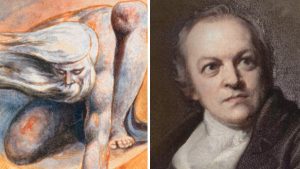In the first of this week’s roundups, we look at the Pulitzer Prize for Nathalie Diaz, and the William Blake biography.
Pulitzer Prize for Natalie Diaz
 It has been rather a good year for Nathalie Diaz, the ASU Department of English associate professor and poet. Earlier this year she was made the youngest chancellor ever to be elected to the Academy of American Poets. Now she has been announced as a 2012 winner of a Pulitzer Prize for her book “Postcolonial Love Poem”.
It has been rather a good year for Nathalie Diaz, the ASU Department of English associate professor and poet. Earlier this year she was made the youngest chancellor ever to be elected to the Academy of American Poets. Now she has been announced as a 2012 winner of a Pulitzer Prize for her book “Postcolonial Love Poem”.
The award ceremony this year took place remotely on 11th June.
Speaking about the award Diaz said she was proud to be a part of a rather incredibly community at ASU that numbered many native staff, students and faculty members. Diaz is Mojave and also an enrolled member of Gila River Indian Tribe. She is delighted to have joined what she referred to as the “Pulitzer room” alongside two other Natives – Louise Erdrich and Marty Two Bulls Sr.
Growing up Diaz lived on the Fort Mojave Indian Reservation. She was passionate about basketball and reading. A college accident forced her to abandon her dreams of a basketball career, but led her instead to poetry. Her first book, which was published in 2012, was an American Book Award winner. This was followed by a second collection of poetry in 2020 which was a finalist for the Forward Prize in Poetry and the National Book Award.
Diaz is the eighth member of the ASU faculty to become a Pulitzer Prize winner; the second to do so whilst being a current member of the faculty. The first was Rita Dove, the former US poet laureate, who was a poetry winner in 1987.
New Biography Offers Insight into Character of William Blake
 During his lifetime William Blake wasn’t taken seriously by many, and a little look into the character of the poet makes it easy to see why. In 1801 the poet got into an argument with a thistle whilst on a country walk.
During his lifetime William Blake wasn’t taken seriously by many, and a little look into the character of the poet makes it easy to see why. In 1801 the poet got into an argument with a thistle whilst on a country walk.
During his 69 years, Blake experienced many beatific visions. In addition to seeing objects as people he would also have visions of angels and demons, God and even on occasion spoke to the spirit of his dead brother.
It was these experiences that were such a significant influence for the poet on many of his works. However much of 18th and 19th Century England also believed he was mad as a result of his visions. Today however he is considered by many to be one of the most influential British poets.
John Higgs has written a biography, titled, “William Blake vs the World”. The book looks at how much better placed we are today to understand the poet than people were when he was alive.
Whilst fans of the painter Van Gogh were happy to admit that he was in fact a little mad, Blakeans have never been happy to admit similar about their hero. Higgs believes it is now possible to say that Blake was in fact sane but did go through a period when his mental health was poor – much of his writing refers to periods of melancholy and depression.


You must register to comment. Log in or Register.